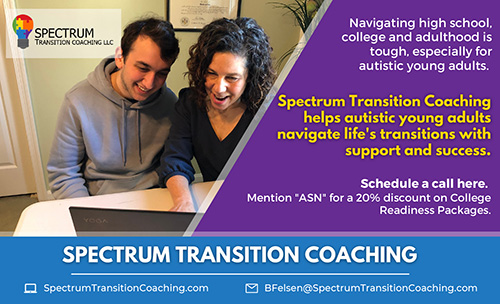Success in college is not guaranteed, especially for autistic students. About 60% of full-time undergraduates receive a bachelor’s degree within 6 years of beginning college at a four-year institution (National Center for Education Statistics, 2020). Only 36% of young adults on the autism spectrum attempt postsecondary education of any kind between high school and their early 20s, including 2-year or 4-year colleges or vocational education (Roux et al., 2015), and only 38.8% of them will complete their degrees (Jackson et al., 2018). If you do the math, only about 14% of autistic high-school students graduate from college.

And at what cost? A recent white paper published by the Autistic Self-Advocacy Network (ASAN) points out that completion of a college degree by an autistic young adult may merely measure persistence, not success (2020). Autistic self-advocates who participated in the focus group upon which the white paper was based reported varied definitions of college success, including full inclusion in campus social life. Closer examination of post-college employment outcomes was also seen as a measure of college success (Autistic Self-Advocacy Network, 2020). But persistence through graduation without a sense of belonging during college or a meaningful career in one’s desired field does not seem like much of a success to me.
The ASAN focus-group participants identified difficulty acclimating to college – transitioning from the life of a high schooler to that of a collegian – as one of several barriers to college success. They reported feeling unprepared for the academic, social, and independent-living expectations encountered at college (Autistic Self-Advocacy Network, 2020). Heading to college often means leaving behind familiar support systems. The stress of these non-academic (and ever-present) aspects of the college experience can make it harder to focus on academics, which can lead to poor grades. And poor grades can further increase stress. Exacerbating these issues are a lack of peer support: 57% of autistic teens have lots of difficulty making and keeping friends (Shattuck et al., 2018). Once this vicious cycle gets going, it can be very difficult for students to pull themselves out of it, especially for the 76% of autistic teens with co-occurring ADHD, anxiety, or depression (Shattuck et al., 2018).
Autistic students may not realize how much support they receive from their families. Nearly half of those teens, for example, have parents who spend several hours a week arranging and coordinating the student’s healthcare (Shattuck et al., 2018). When students start college and lose those supports, the cycle of stress begins. High schools must provide comprehensive accommodations to support academic progress, but transition teams are ill-equipped to discuss social and independent-living skills or how to obtain accommodations in college. The same scaffolding that helps autistic students flourish in high school may cause them to flounder during the college transition.
When I work with autistic high-school students and their families, I encourage them to consider how the daily rhythm and requirements of college life differ from high school. The strong support systems these students have in high school provide an excellent safety net as they work to build crucial college-readiness skills in areas like self-advocacy, executive functioning, social communication and interaction, and independent living. Building these skills also helps these students build confidence and increase their chances for true success and fulfillment in college and beyond.

Beth Felsen, MA
Beth Felsen, MA, is Founder and Success Coach at Spectrum Transition Coaching, LLC. To contact Beth or learn more about her work with autistic young adults, visit her website www.spectrumtransitioncoaching.com.
References
Autistic Self Advocacy Network. (2020). Benchmarks to Inclusion: Creating Core Principles to Facilitate Autistic Student Success in Higher Education. https://autisticadvocacy.org/wp-content/uploads/2021/03/Benchmarks-paper-draft.pdf
Jackson, S.L.J., Hart, L., & Volkmar, F.R. (2018). Preface: Special Issue—College Experiences for Students with Autism Spectrum Disorder. Journal of Autism and Developmental Disorders, 48(3), 639–642. https://doi.org/10.1007/s10803-018-3463-7
National Center for Education Statistics. (2020, April). Undergraduate Retention and Graduation Rates. The Condition of Education. https://nces.ed.gov/programs/coe/indicator_ctr.asp
Roux, A.M., Shattuck, P.T., Rast, J.E., Rava, J.A., & Anderson, K.A. (2015). National Autism Indicators Report: Transition into Young Adulthood. Life Course Outcomes Research Program, A.J. Drexel Autism Institute. https://drexel.edu/~/media/Files/autismoutcomes/publications/National%20Autism%20Indicators%20Report%20-%20July%202015.ashx
Shattuck, P.T., Rast, J.E., Roux, A.M., Anderson, K.A., Benevides, T., Garfield, T., McGhee Hassrick, E., & Kuo, A. (2018). National Autism Indicators Report: High School Students on the Autism Spectrum. Life Course Outcomes Program, A.J. Drexel Autism Institute, Drexel University, 2018 https://drexel.edu/~/media/Files/autismoutcomes/publications/2018%20NAIR_final_digital_onepage.ashx






[…] By addressing these common challenges and utilizing strategies that work best for each individual, autistic students can set themselves up for a successful college experience. […]